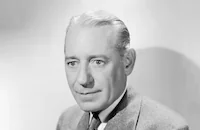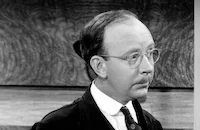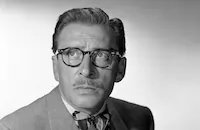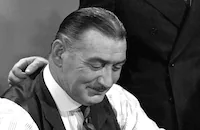Now I'll Tell
Brief Synopsis
Cast & Crew
Spencer Tracy
Helen Twelvetrees
Alice Faye
Robert Gleckler
Henry O'neill
Hobart Cavanaugh
Film Details
Technical Specs

Synopsis
In 1909, at the Saratoga racetrack, gambler Murray Golden convinces the man at the betting window to trust him for a $200 bet on the strength of a telegram sent to him purportedly by multi-millionaire Harry Payne Whitney, which gives a tip on a horse. Murray, in fact, earlier composed the wire himself. Although the horse does not win, Murray invites the party he is with to join him in a celebration. One of the women in the party, Virginia, decides to marry Murray, although she has no idea how he makes his money. Murray has ambitions of hobnobbing with the leaders of society, and he lives by the creed that one should do anything one can get away with. In 1914, on their fifth anniversary, Murray, who now runs a successful gambling house in New York, promises Virginia, who is bored and lonesome, that he will quit the business as soon as he has made $500,000. That night, Murray meets cabaret singer Peggy Warren, the girl friend of Al Mositer, a gangster whom he orders to leave, and at her instigation, they begin an affair. Although the evening's winnings put Murray's income over $500,000, he tells Virginia that he wants to continue until he makes "real" money so that he can do other things. By 1919, Murray has given Peggy a $100,000 trust fund and a Park Avenue apartment, but he remains in love with Virginia. Upon learning that Mositer has fixed a championship fight by paying one of the fighters, Eddie Traylor, to take a dive, Murray pays the other fighter, George Curtis, to go down in an earlier round and then places a bet with Mositer. After the fight goes the way Murray planned, Virginia, who has attended with a friend, overhears talk that Peggy has been Murray's girl friend for years. She starts to pack, but Murray convinces her that his cohort Freddie is the man involved with Peggy. Murray then promises to quit gambling and go into the insurance business. During their discussion, Murray gets a call telling him that Traylor has been found murdered. Five years later, Curtis, who was broken up by Traylor's death, is an alcoholic. After Mositer tricks him into admitting that Murray convinced him to take a dive, Mositer vows revenge. As Murray, now ostensibly in the insurance business, visits his boyhood friend, Tommy Doran, who is now a police detective, to try to bribe him for a client, he gets a call from Freddie telling him that Virginia has been kidnapped and is being held for ransom by Mositer. Murray orders Freddie to pay anything and hurries back to town in a cab with Peggy. He urges the driver to speed, and the cab crashes into a truck killing Peggy. Virginia, who is released unharmed, tells Murray that she will seek a divorce in Paris to regain her self-respect. In 1928, Murray, nearly broke, loses $50,000 to Mositer in a card game. When he gets a telegram that Virginia is returning from Europe, he thinks she is coming back to him. Feeling that his luck is changing, he pawns her jewelry, which he has kept in the safe-deposit box, to gamble in a crap game. Virginia tells him that she is marrying another man and that she came back to get her jewelry. Still in love with her, Murray promises to get the jewelry back. He takes out an insurance policy, and then tries to win the money to buy back the jewelry from Mositer in a crap game, but loses over $200,000 to him. When Murray tells Mositer that he is going to reveal to the district attorney that Mositer killed Traylor, Mositer shoots Murray, who then confesses that he arranged to die so that should he lose, the insurance money could be used to buy back Virginia's jewelry. Tommy brings Virginia to Murray's hospital room and encourages her to lie to him. After she tells Murray that she's coming back to him, Murray dies.

Cast

Spencer Tracy
Helen Twelvetrees

Alice Faye
Robert Gleckler

Henry O'neill

Hobart Cavanaugh
G. P. Huntley Jr.

Shirley Temple
Ronnie Cosbey
Ray Cooke
Frank Marlowe
Clarence Wilson
Barbara Weeks
Theodore Newton

Vince Barnett
Jim Donlan

Charles Sellon
Samuel T. Godfrey
Jack Baxley
John M. Sullivan
Tom Mcguire
Donald Haines
Cosmo Kyrle Bellew
Selmer Jackson
Lane Chandler
Charles Moore

Irving Bacon
Charles Dow Clark
Claire Du Brey
Catherine Perry

Leon Waycoff
Larry Mcgrath
Frankie Dolan
Patrick J. Moriarity
Georgia O'dell
Allan Fox
Paddy Sullivan
"red" Stevens
Gordon De Main
Lenita Lane
George Davis

Mae Madison
Harry C. Bradley
Dorothy Phillips
Louis Payne

Alice Calhoun

Joseph Crehan

Lucille Brown
Edwin Stanley

Billy Franey
Lew Harvey
Bob Ryan
Wesley Giraud
Walter Armitage
Claude King
Mary Forbes
Alden Chase

Jack Mower

Edward Keane

Gertrude Astor

James Flavin

June Vlasek
Blanca Vischer
Ruth Peterson
Frank Melton
Ruth Warren

Eddie Kane
Brooks Benedict
Freddy Howard
Boothe Howard
Eddie Hart
Charles Williams
Tommy Dugan
George Lloyd
James Murray

Clay Clement
Dorothy Christy
Jack Norton

Susan Fleming
John Marston
Robert Ellis
Inez Norton
John Sheehan
Ned Norton
Stanley Price
Crew
Harry Akst
Jack Boland
Lew Brown
Edwin Burke
E. W. Butcher
William D. Flick
Sol Halprin
Rita Kaufman
Arthur Lange
Robert Mack
Bud Mautino
Jack Otterson
Ernest Palmer
Mrs. Arnold Rothstein
Emmett Schoenbaum
Harold Schuster
Winfield Sheehan
Larry Williams

Film Details
Technical Specs

Quotes
Trivia
Notes
As the print viewed was a re-release print, the onscreen credits were taken from a screen credit billing sheet in the Twentieth Century-Fox Records of the Legal Department at the UCLA Theater Arts Library. The main character in this film is based on the gambler Arnold Rothstein, who, according to modern sources, acted as a go-between for businessmen and criminals in their dealings with New York politicians and police. Rothstein was reported to have devised the Black Sox scandal during the 1919 World Series. He was shot during a poker game and died two days later, November 6, 1928, without revealing his killer. Variety noted that at the time of the film's release, Rothstein's murder was still unsolved and commented that the character "Murray Golden," "resembles the noted Broadway gambling man in his moods and methods, many of which will be recognized by those who knew or studied him." New York Times called Spencer Tracy's portrayal "as thorough a characterization as has been seen on the screen."
According to information in the legal files, on July 11, 1933, Fox took out an option on a story to be written by Mrs. Carolyn Behar, formerly Mrs. Arnold Rothstein, which would "exploit and describe the activities, incidents and events in the life of Arnold Rothstein." A separate agreement gave Fox the right to furnish a ghostwriter to work with Behar if the work was not completed by October 1, 1933. The book, which was also entitled Now I'll Tell and published by the Vanguard Press on May 3, 1934, was written by Behar under the name Mrs. Arnold Rothstein, in collaboration with Donald Henderson Clarke. Fox obtained all rights to the book, except publication rights. Behar read the shooting script by Edwin Burke, which was finished before her book was completed, and signed a statement that read, "Some of the incidents included in the continuity are not based on real facts or incidents in the life of the late Arnold Rothstein and as to these incidents, I do not make any representations to the public or otherwise that they are true, but if these incidents are used in the picture, I will have no objection to their use, provided, I am not called upon to state to the public that they are actual happenings."
In an affidavit relating to a plagiarism claim concerning the ending of the film, Burke stated that the ending he wrote was developed from a suggestion made by Rothstein's black secretary, Thomas Farley. Fox had authorized Burke to travel to New York to interview Farley and some underworld characters, and Farley related an incident in which he found Rothstein fooling with a revolver in his office. Farley told him, "If I were you, Mr. Rothstein, I would not use that revolver," and Rothstein replied, "If I had any guts, I would use it." They left the office together and took a taxi, and when, at an intersection, Rothstein left the taxi, he was almost struck by a couple of cars. Burke stated in the affidavit that the film's ending was derived from that incident.
This was the only complete film that Burke, a Fox contract writer, directed; the previous year, he had co-directed retakes on Hello Sister!. According to the legal records, Fox hired a camera crew consisting of Sol Halprin and Larry Williams to take various shots of New York and the vicinity for this film and One More Spring (see below). Fox also received permission to take certain shots and stills of the interior of "Lindy's Restaurant" to be used in the film. Allen Jenkins was to be loaned by Warner Bros. for a role, but the agreement was not executed.












